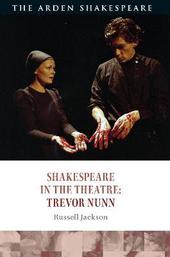
|
Shakespeare in the Theatre: Trevor Nunn
Hardback
Main Details
| Title |
Shakespeare in the Theatre: Trevor Nunn
|
| Authors and Contributors |
By (author) Professor Russell Jackson
|
| Series | Shakespeare in the Theatre |
|---|
| Physical Properties |
| Format:Hardback | | Pages:264 | | Dimensions(mm): Height 198,Width 129 |
|
| ISBN/Barcode |
9781474289580
|
| Classifications | Dewey:792.95 |
|---|
| Audience | | Tertiary Education (US: College) | |
|---|
| Illustrations |
6 bw illus
|
|
Publishing Details |
| Publisher |
Bloomsbury Publishing PLC
|
| Imprint |
The Arden Shakespeare
|
| Publication Date |
15 November 2018 |
| Publication Country |
United Kingdom
|
Description
Sir Trevor Nunn is one of the most versatile and accomplished directors in the English-speaking theatre. This book examines his achievements as a director of Shakespeare within the wider context of debates on the cultural politics of Britain's theatrical institutions in the twentieth and twenty-first centuries. His approach has been marked by the combination of close textual analysis with inventive theatricality, in performance spaces ranging from the large stages of the Royal Shakespeare Company and the National Theatre to the intimacy of the companies' studio theatres. The principal focus of the book is on Nunn's work as director of Shakespeare during his artistic directorship of the RSC and the NT. The four core chapters focus in detail on major productions that can be said to have challenged and changed perceptions of the plays, including The Winter's Tale (RSC, 1969), the 'Roman Plays' season (RSC, 1972) and All's Well That Ends Well (RSC, 1982), and the studio productions of Macbeth (RSC 1976), Othello (RSC, 1989) and The Merchant of Venice (NT, 1999). The study draws on archive material, as well as reviews and other published commentary, including that of actors who have worked with him.
Author Biography
Russell Jackson is Emeritus Professor of Drama at the University of Birmingham, UK. His work focuses on the relationships between text and performance - particularly but not exclusively of Shakespeare's plays - in their social and intellectual context and in a wide range of media. He is currently engaged in studies of the representation of the theatre in the other arts.
ReviewsI trust Jackson's reading of that production's theatrical signals more than I trust my own, in large part because he saw most of the productions he writes about several times, watching as the director made them tighter, deeper, and more finely detailed. Jackson extensively and meticulously documents every production's design features, acting choices, and critical reception. But I would just as soon forego the documentation and trust Jackson's memory, his powers of description, and his ability to get to the heart of each production's aesthetic. Jackson's book, like Nunn's aesthetic, is conceptually tight, interpretively deep, and intricately detailed. * Theatre Review * Jackson's rich eyewitness study reveals how Nunn, without ever publishing a manifesto, has been one of the key Shakespearean interpreters of our time, keeping live Shakespeare in touch with mainstream entertainment (through his cross-fertilizations with the big-budget musical) and with the arts of the screen (through his work in close-up, studio spaces). This is an important, accessible study of an important and accessible director. -- Michael Dobson, The Shakespeare Institute, University of Birmingham, UK Jackson's book offers a fascinating insight into the career of a prolific theatre director, about whom surprisingly little has been published. It gives an invaluable overview of Nunn's career, alongside detailed accounts of particular Shakespeare productions. -- Dr Abigail Rokison-Woodall, The Shakespeare Institute, The University of Birmingham, UK With a masterfully even hand Jackson measures the way a major director's work navigated the aesthetic, intellectual, administrative and financial challenges of a long and culture-shaping career. This is a deeply knowledgeable book of the kind that can only be generated out of sustained critical investment in the arts of performance. -- Andrew Hartley, University of North Carolina at Charlotte, USA
|